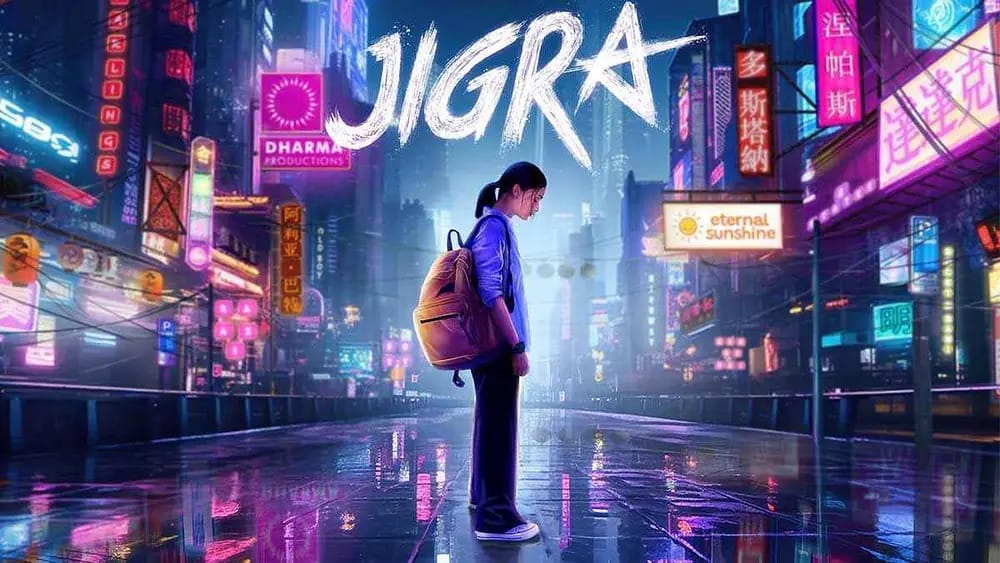In Jigra, Alia Bhatt plays the character Sathyabhama Anand, a single-sister quickly becoming the parent-figure to her brother as their father had died by free-falling from their balcony. The visual-death of their father has set the dark emotions right in place and takes us on a journey from there. Sathya doesn’t even flinch in action the moment she learns that her brother had been arrested for the alleged possession of drugs in Hanshi Dao, a fictional island resembling something like Malaysia or Singapore, especially because of their authoritative punitive measures on drug charges.
Sathya: The alpha-sister in Jigra
The Alpha as a character trait is full of controversy, especially after Sandeep Reddy Vanga’s famous scene in Animal where Sandeep glorifies the ancient alpha traits of hunter-gatherers with a rock guitar’s note. The scene takes place when Ranvijay from Animal tried to convince Geethanjali to pick him through the tale of sexual preferences of women, back in the ancient days. However, if you look closely at psychological level instead of at cinematic execution level, you will realise how Vasan Bala treated the Alpha trait differently from Sandeep.
In Jigra, Alia Bhatt plays the character Sathyabhama Anand, a single-sister quickly becoming the parent-figure to her brother as their father had died by free-falling from their balcony.
What does Sathyabhama Anand and Ranvijay Singh ‘Balbir’ have in common? What makes her an Alpha-sister in Jigra? Both love their families, both had traumatic and neglected childhoods, both don’t care about the consequences if their loved one is involved, both love to be the ones who take the final decision, both are quick and first to act in crisis, both trust their instincts. And, finally, the most important one, the moral compass of both is completely dead.
Take the scene in Jigra where the audience learns that there has been a fire accident at Sathya’s uncle’s place. By following the visual language, we know who did it. But, how did Sathya know about the conspiracy run by her uncle to frame her brother? Her instincts. Sathya also tries to go in the lane of self-destruction– the same lane Sandeep Reddy Vanga’s characters love to stay on always– but only in a practical-vehicle.
She attempts a motivated suicide in the anticipation of delaying her brother’s death sentence. These two scenes in Jigra have potential to be termed as toxic. But, nobody thinks that, neither the critics, nor the audience. Because, Vasan Bala’s clever portrayal of these traits are as just traits, not as cinematic events. Vasan did a character exploration, not a cinematic celebration of these traits. But, he eventually did take cinematic liberty through prison break scenes. It is alright, since it is cinema.
The economic hierarchy of a ‘family’ in Jigra
In Jigra, Ankur, played by Vedang Raina as Sathya’s loving brother, is used as collateral damage in the process of bailing out their cousin who comes from a filthy-rich family. They both had been arrested for the possession of drugs in Hanshi Dao. Someone had to be in jail and only one can walk out with bail, suggests the legal counsel from India, appointed by the rich uncle. So, why not the poorer one in the ‘family’ be the scape-goat?
They both had been arrested for the possession of drugs in Hanshi Dao. Someone had to be in jail and only one can walk out with bail, suggests the legal counsel from India, appointed by the rich uncle.
Alia Bhatt’s character was always in survival mode. She has severe trust issues, which are legitimate. She doesn’t trust anyone so easily, especially the filthy rich family that always keeps them reminded of their place in the economic hierarchy. In Jigra, Sathya had to be in her event management wear even at a wedding. That says a lot about the relationship-dynamic among them. The emotional distance between her and her ‘family’ was never bridged.
However, just like her risk-metre has no limits, her trust metre also has no limits when it comes to saving her brother’s life in Jigra. That is her survival mode. She could easily trust lovable Manoj Pahwa and sincere but guiltful Rahul Ravindran, an ex-Hanshi Dao policeman. Her trust-metre doesn’t tick off as the risk-metre raises, Sathya can pull any strings to save her brother in Jigra, and her moral-metre is also destroyed long ago. She can mistrust Rahul Ravindran only when she feels her brother’s life is in danger. She fights him and kills him.
Alia Bhatt’s best is Vasan Bala’s mediocre
In Jigra, Alia Bhatt played the fierce character of Sathya with so much conviction that you feel you already know the character just waiting for her to explode through the story. For example, in the first shot of Jigra, Sathya closes her eyes, takes a quick scan of the room from an eagle’s POV and lists out the things to be done to her assistant-colleague. It is just a scene of seconds and you already know that she is the centre of all decisions, the alpha one.
Even though Jigra is one of Alia’s best acting, it is certainly not one of Vasan Bala’s best. The writing is neither focused on the psychology of the characters nor the plot-and-screenplay. The haphazard writing by Bala and Debashish Irengbam makes the editor Prerna Saigal’s job the hardest: to maintain the coherence of emotion and plot as well.
The exhaustion of the audience is obvious when the father’s free-falling is shown multiple times in Jigra without ever properly visiting it neither emotionally nor retrospectively.
The exhaustion of the audience is obvious when the father’s free-falling is shown multiple times in Jigra without ever properly visiting it neither emotionally nor retrospectively. Why was the father made to die anyway? Just to exploit the emotion of a dead father who left the children abandoned? And, forget about the mother, we don’t utter that word at all in Jigra! We still don’t know anything about Sathya and Ankur’s father and his suicide, let alone the mother whose existence itself never came into discussion in the whole 153-minute film.
Vasan Bala’s convenient world building must be appreciated. Especially, in the current era when world-building is being ambitious and blatantly explicit. Bala had created an entire Hanshi Dao nation, albeit a copy of existing nations, conveniently, and packed the prison-break thriller with the core emotional bond of a brother and sister. Alia Bhatt and Vedang Raina added phenomenal performances suited to the intense sibling drama. JIgra is a decent watchable emotional thriller, especially for the powerful performances of Alia Bhatt.
Jigra is now playing in theatres and will soon stream on Netflix.
About the author(s)
Azdhan (He/Him) is a full-time film critic freelancing for Feminism In India. If he is not reading or writing, he will just be zoning-out– even if there is no window– always thinking of writing his next novel to adapt it into a screenplay. The backend process of trying to build something that can solve urban loneliness is also always on his mind.








